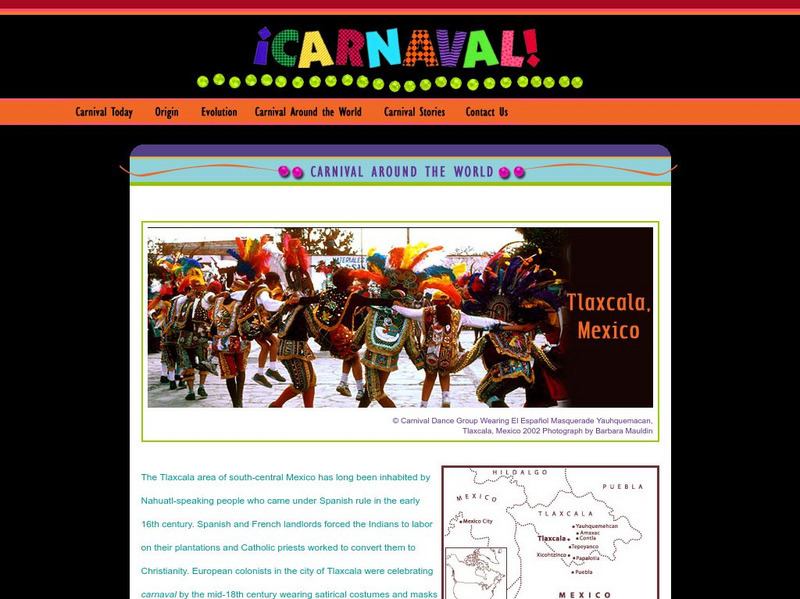Curated OER
Plants and Animals: Partners in Pollination
Students identify the plant parts and bee structures that are involved in pollination. They simulate pollination in a group activity and process the information.
Curated OER
Japan: Images of a People
Students learn the geography of Japan and its location in reference to the United States.
Curated OER
Views of the American West: True or False?
High schoolers explain that a landscape painting may or may not accurately represent a specific place. They identify techniques that create the illusion of three-dimensional space on a flat surface.
Curated OER
Climate and Cultures of Africa
Students gain an understanding of the relationship between climate and culture in the sub- Saharan Africa. Students will complete short exercises pertaining to the various cultures of Africa and the climate in which they live....
Curated OER
Minerals, Crystals, and Gems
Students discover the relationships between minerals, crystals and gems. They bring in rocks that they find at home, in the schoolyard, etc. and examine them and attempt to identify them. They set up a classroom exhibit that includes all...
Curated OER
JAPAN, IMAGES A PEOPLE
Students interpret Japanese and American paintings; evaluate paintings as sources of cultural and historical information
Curated OER
Dinosaurs Were Real!
Students investigate the history of dinosaurs, as real animals. In this dinosaur lesson plan, students examine basic concepts that help them understand the history of all life. Included in this article is information on the world of the...
Curated OER
Lift and Drag: Principles of Flight and the Soaring Imagination
Learners construct models of early gas balloons and gliders. In this balloon and glider lesson, students create models of early gas balloons and gliders, discover how the forces of lift and drag effect aircraft in flight, and put on...
Curated OER
Becoming a "Gringo" Immigrants, Language Learning and Acculturation
High schoolers examine the experience by immigrants coming to America who are Spanish-speaking. As a class, they define "Gringo" and read poems whose authors first language is Spanish. In groups, they participate in different sections...
Curated OER
Creatures from Planet X: Spiders
Students are given a description of some fascinating animals from "Planet X". They follow the descriptions given to illustrate one of these animals paying careful attention to introduced vocabulary such as 'appendages', 'receptors', and...
Curated OER
Facts, Feats and Folklore: Spiders
Students review and discuss a variety of sayings, folklore and superstitions about spiders. They discuss this information and choose either an interesting fact or appealing foklore tradition to illustrate.
Curated OER
Lewis and Clark: The Language of Discovery
Young scholars replicate some of the trailblazing methods of Lewis and Clark on a fifteen-minute "writing journey" through the school or neighborhood.
Curated OER
Animal Encounters
Young scholars use their visualizing and interpreting skills to produce original writings and artwork.
Curated OER
How Things Fly
Students observe photographs of selected twentieth-century aircraft at the National Air and Space Museum and note differences in the design of aircraft wings, fuselages, and engines.
Curated OER
How Things Fly
Students, by drawing on their own experiences, discuss and examine the basic physics of flight. They participate in a variety of activities regarding flight.
Curated OER
Stories of the Wrights' Flight
Learners examine and compare primary and secondary source accounts of the Wright brothers' first flights on December 17, 1903.
Curated OER
Money Talks
Students move from fact finding to interpretation as they examine paper money from the time of the American Revolution. In the final exercise, they use the issue dates of the bills to construct a chronology of political changes during...
Curated OER
Pictures Telling Stories
Students see the importance of primary sources in the study of history, but also the limitations of relying only on primary sources of taking the money, as it were, at face value.
Curated OER
Spy on a Spider
Pupils view slides or live specimens to name and describe the distinguishing features of groups of arthropods, especially spiders and insects. They complete worksheets, observe webs and then search for and record where spiders can be...
Curated OER
Letters from the Japanese American Internment
Students make deductions about life in an internment camp by reading and comparing letters written to Clara Breed. Along the way, they consider the advantages of looking at a historical event from the multiple points of view of...
Smithsonian Institution
Smithsonian Learning Lab: Hispanic Heritage Teaching Resources
This site is your link to teaching resources about Hispanic heritage. Choose from topics such as Musica del Pueblo, Mexican America, Latino Voices in American Art, or many others. Explore links to interactive exhibits, lesson plans, and...
Incredible Art Department
The Incredible Art Department: Art of Mexico Latin American Art
Explains the significance of Hispanic Heritage Month and provides a huge collection of links to websites looking at Mexican and Hispanic art and culture, as well as some lesson plans.
Other
Museum of International Folk Art: Carnaval Around the World; Oruro, Bolivia
From the exhibit "Carnaval Around the World" at the Museum of International Folk Art, we have a feature page on the celebration as it occurs in Oruro, Bolivia. With a description, photos, map and audio clip this is a nice glimpse into...
Other
Museum of International Folk Art: Carnaval Around the World; Tlaxcala, Mexico
From the exhibit "Carnaval Around the World" at the Museum of International Folk Art, we have a feature page on the celebration as it occurs in Tlaxcala, Mexico. With a description, photos, map and audio clip this is a nice glimpse into...






















